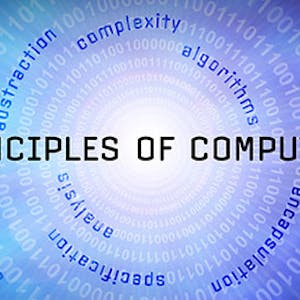Principles of Computing (Part 1)
This two-part course builds upon the programming skills that you learned in our Introduction to Interactive Programming in Python course. We will augment those skills with both important programming practices and critical mathematical problem solving skills. These skills underlie larger scale computational problem solving and programming. The main focus of the class will be programming weekly mini-projects in Python that build upon the mathematical and programming principles that are taught in the class. To keep the class fun and engaging, many of the projects will involve working with strategy-based games.In part 1 of this course, the programming aspect of the class will focus on coding standards and testing. The mathematical portion of the class will focus on probability, combinatorics, and counting with an eye towards practical applications of these concepts in Computer Science.
Recommended Background - Students should be comfortable writing small (100+ line) programs in Python using constructs such as lists, dictionaries and classes and also have a high-school math background that includes algebra and pre-calculus.
None
Syllabus
Syllabus - What you will learn from this course
Week 1
Required Python knowledge, coding standards, and machine grading
Week 2
Testing, plotting, and grids
Week 3
Probability, randomness, and objects/references
Week 4
Combinatorics, generators, and debugging
Week 5
Counting, growth of functions, higher-order functions
FAQ
When will I have access to the lectures and assignments?
Access to lectures and assignments depends on your type of enrollment. If you take a course in audit mode, you will be able to see most course materials for free. To access graded assignments and to earn a Certificate, you will need to purchase the Certificate experience, during or after your audit. If you don't see the audit option:
What will I get if I subscribe to this Specialization?
When you enroll in the course, you get access to all of the courses in the Specialization, and you earn a certificate when you complete the work. Your electronic Certificate will be added to your Accomplishments page - from there, you can print your Certificate or add it to your LinkedIn profile. If you only want to read and view the course content, you can audit the course for free.
Is financial aid available?
Yes. In select learning programs, you can apply for financial aid or a scholarship if you can’t afford the enrollment fee. If fin aid or scholarship is available for your learning program selection, you’ll find a link to apply on the description page.
Reviews
Yet another brilliant course in a brilliant specialization. On to part 2!
i enjoyed a lot, the syllabus in this course is really useful, and the application that we see in our day to day life
Most of the course was awesome, just wasn't crazy about the testing questions at the end of each quizz
definitely gets you thinking the right way about programming (math, algorithms, efficiency, etc.
